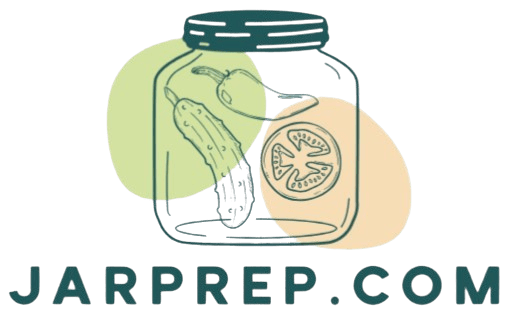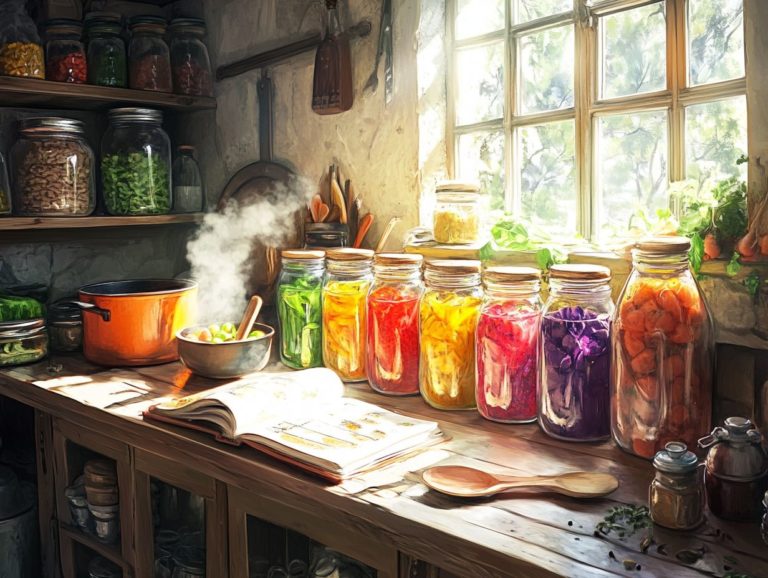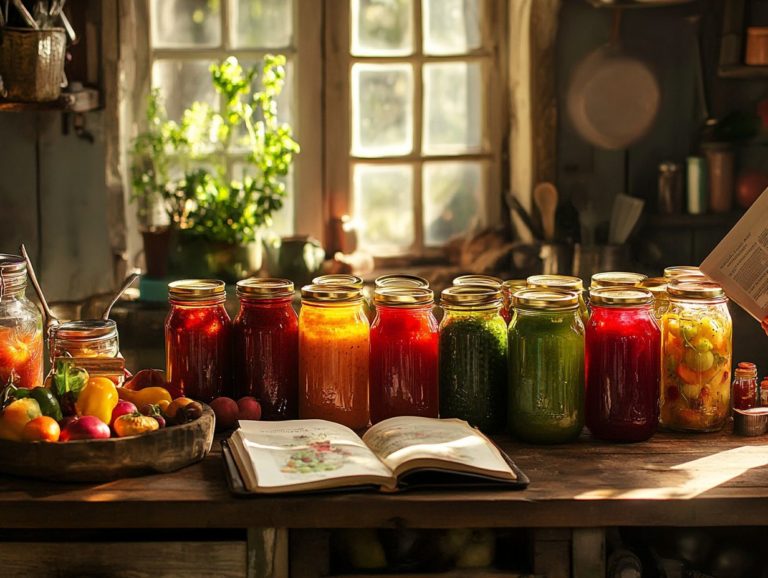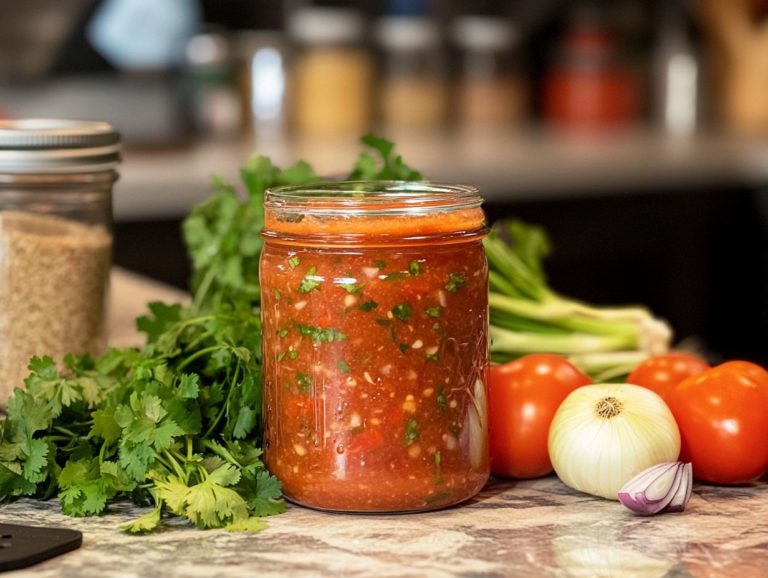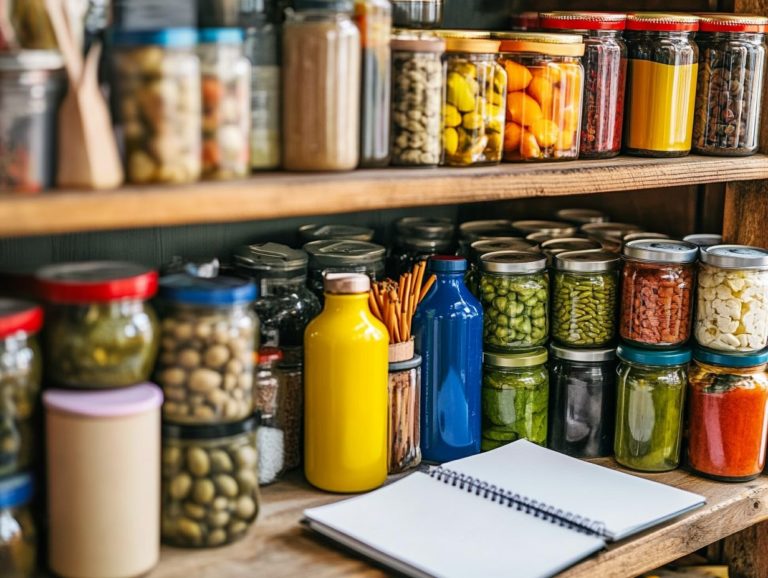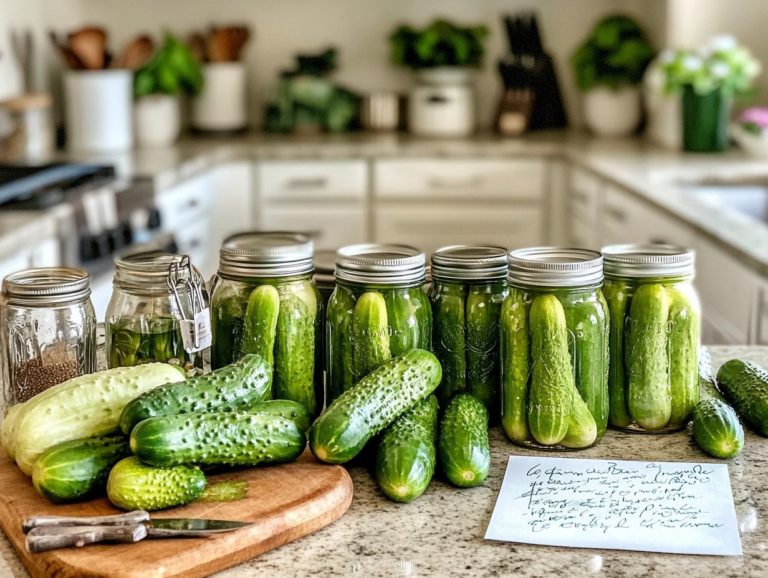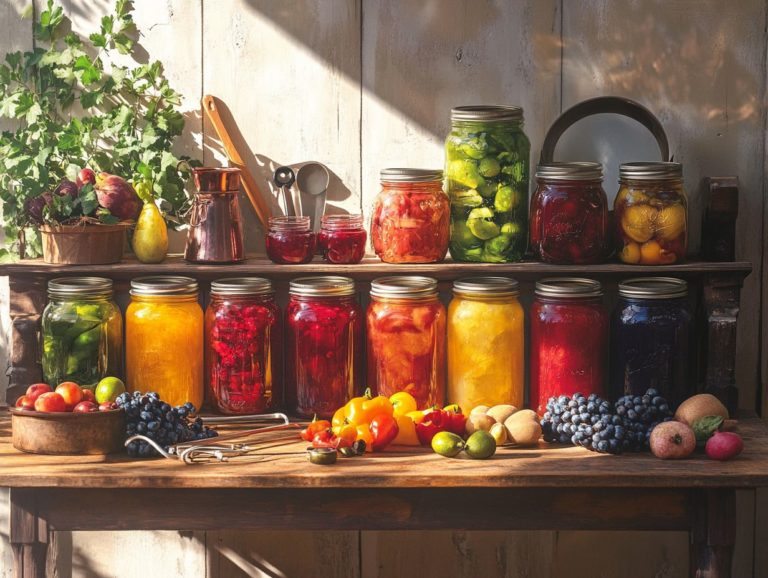Can I Can Using Glass Containers?
Canning with glass containers has become a popular choice among home preservers, thanks to its many benefits, including environmental sustainability and health advantages.
However, it does come with some risks, such as breakage and spoilage. Let s explore the exciting benefits of using glass for canning, outline safe techniques to help you minimize those risks, and present alternatives for those who wish to diversify their storage options.
With practical tips for successful canning, you ll be fully equipped to preserve your favorite foods safely and effectively.
Contents
- Key Takeaways:
- Benefits of Using Glass Containers
- Potential Risks of Canning with Glass
- How to Safely Can with Glass Containers
- Alternatives to Glass Containers
- Ready to master the art of canning? Here are some essential tips!
- Tips for Successful Canning with Glass Containers
- Frequently Asked Questions
- Can I Can Using Glass Containers?
- Canning with Glass Containers: Key Benefits
- What Types of Glass Containers Can I Use for Canning?
- Do I Need to Sterilize Glass Containers Before Using Them for Canning?
- Can I Reuse Glass Containers for Canning?
- Are There Any Safety Precautions I Should Take When Canning with Glass Containers?
Key Takeaways:
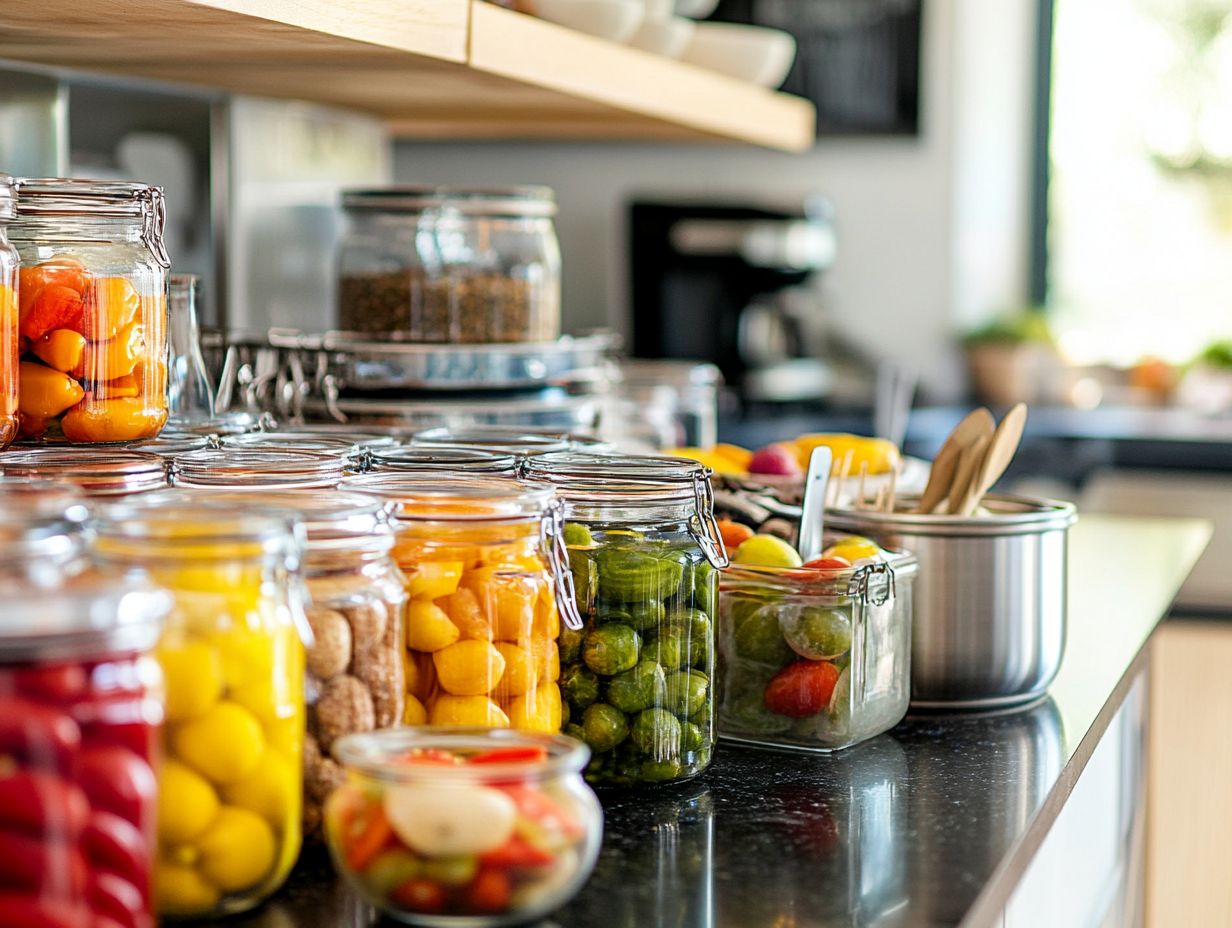
- Glass containers help the environment by being reusable and recyclable.
- Canning with glass helps avoid harmful chemicals found in some plastics.
- Proper techniques can greatly reduce risks like breakage or spoilage.
Benefits of Using Glass Containers
Utilizing glass containers for food storage and preservation presents many advantages, including exceptional durability, sustainability, and safety for food-grade applications. Unlike plastic, glass is less reactive, preserving the flavors and nutrients of your foods think pickles and spaghetti sauce beautifully.
Glass containers also support environmental sustainability through the recycling process and adhere to food safety regulations set by esteemed organizations like the USDA and FDA. The integrity of glass guarantees that your food remains uncontaminated, making it the ideal choice for home canners and discerning consumers alike.
Environmental Impact
The environmental impact of using glass containers is quite remarkable. They are entirely recyclable and significantly lessen the reliance on plastic packaging.
Unlike plastic, which can stay in landfills for centuries, glass can be recycled endlessly without any degradation in quality. This durability enhances the lifecycle of the material and minimizes the demand for new resources, conserving energy and reducing greenhouse gas emissions.
The eco-friendliness of glass packaging means that each time you reuse or recycle it, you contribute to a more sustainable future. By opting for glass, you whether as an individual or a business play a vital role in reducing waste and promoting the circular economy, making a tangible impact for our planet.
Health Benefits
Using glass containers for food storage offers health benefits. They are made from food-grade glass that is free from harmful chemicals like BPA.
These containers form an impenetrable barrier against contaminants, ensuring that the flavor and freshness of your stored food remain completely intact. Unlike plastic alternatives that can leach harmful substances, particularly when exposed to heat or as they degrade over time, glass is a stable and durable choice.
With stringent health safety regulations in place for food storage, choosing glass protects food quality and promotes a culture of safe preservation practices. The transparency of glass makes it easy for you to identify contents, reducing the chances of spoilage. This simple feature encourages healthier habits by helping you keep track of your food inventory effortlessly.
Potential Risks of Canning with Glass
Canning with glass containers is a favored method for preserving food, but it comes with its own set of potential risks. Seal failures, jar breakage, and contamination can threaten food safety, making it crucial for you to understand the consequences of improper sealing and using damaged jars during the canning process.
By adhering to safety regulations and guidelines, you can significantly reduce these risks and maintain the integrity of your canned goods, whether it’s fruit jams or pickles. Remember, a little diligence goes a long way in ensuring your culinary creations remain safe and delicious.
Breaking and Shattering
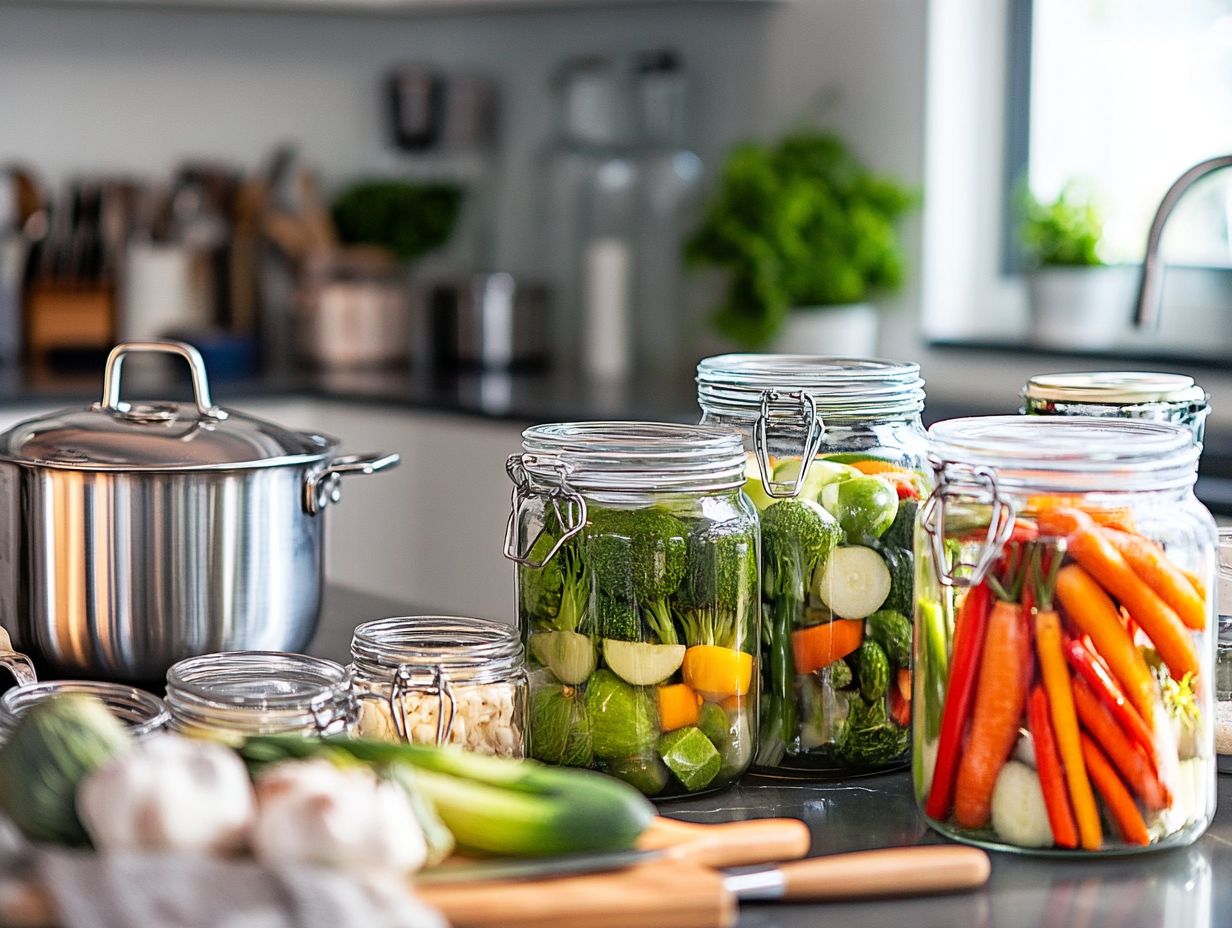
Using glass jars for canning comes with risks, including breakage. This can cause injuries and spoil your food.
Understanding why jars break is crucial for home canning. Factors like sudden temperature changes, poor seals, and the fragility of glass all play a role.
For instance, tempered glass jars resist temperature changes better. Safe handling practices are just as important.
Before canning, check your jars for cracks or chips. This simple step helps keep you safe and ensures your food stays good.
Contamination and Spoilage
Contamination and spoilage are serious concerns when using glass containers for canning. Seal failures can put your food at risk.
If jar seals aren’t secure, air can enter and allow harmful bacteria to grow. This is more likely with unreliable lids or improper sealing.
Following the recommended processing times is essential. These guidelines help eliminate pathogens and keep your food safe.
By understanding the risks of poor sealing, you’ll see why using quality materials and following safety protocols is vital.
How to Safely Can with Glass Containers
To can foods safely in glass containers, follow proper techniques that ensure food preservation and meet USDA standards. Choose the right jars, like Mason jars, and check that the seals are intact.
Knowing the processing times for different foods, such as tomato soup and cranberry juice, is key to successful canning.
Proper Canning Techniques
Mastering canning techniques is essential for preserving food and reducing contamination risks. Methods like hot water bath and pressure canning are effective when used correctly.
Hot water baths are great for high-acid foods like fruits and pickles, while pressure canners are necessary for low-acid foods like vegetables and meats.
Regularly inspect jars before sealing for any cracks or chips. A tight seal and proper headspace are crucial to keeping your food safe.
Alternatives to Glass Containers
While glass is popular for canning, there are many alternatives. Consider using commercial jars or reusable containers made from food-safe materials.
Comparing Different Types of Canning Containers
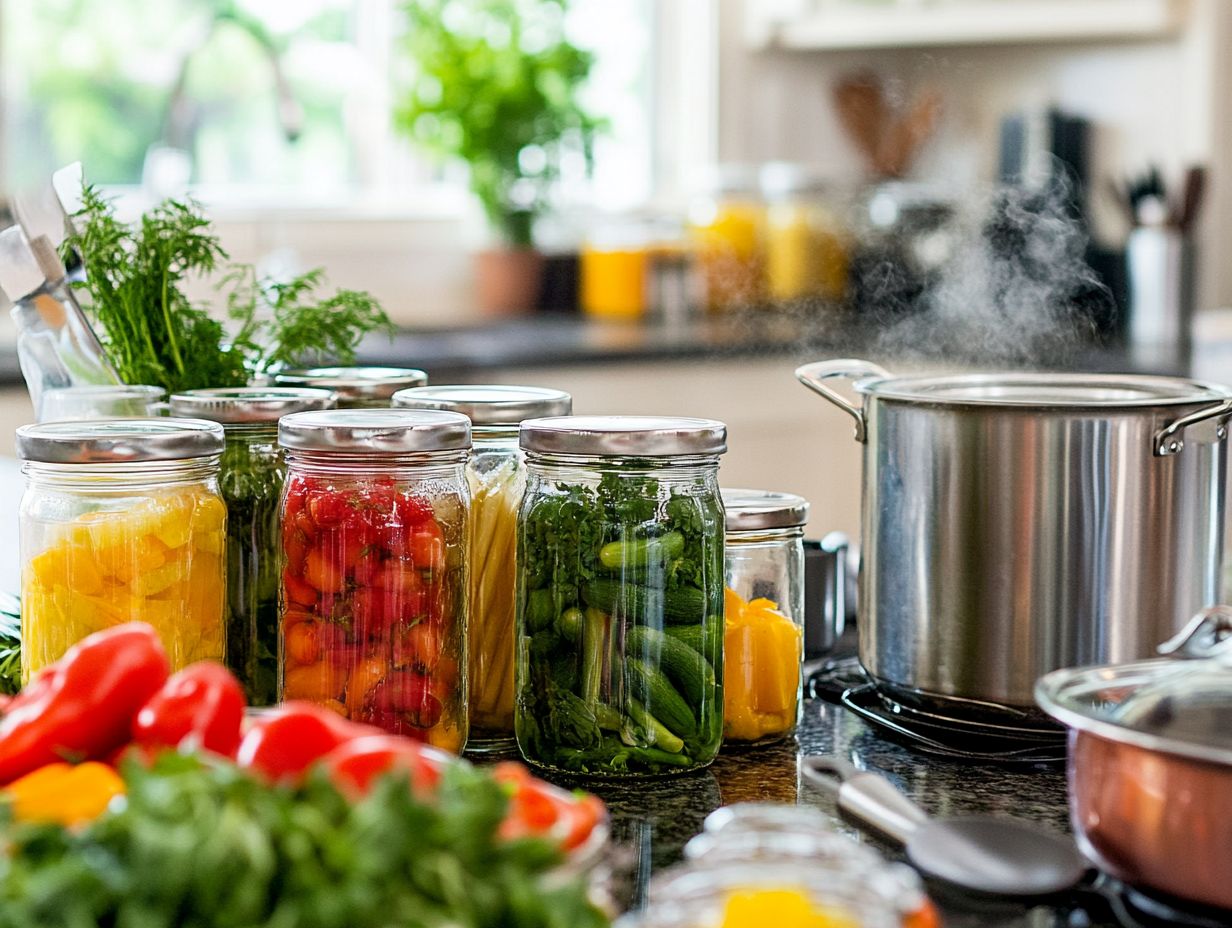
When comparing various types of canning containers like glass jars, metal tins, and commercial jars significant differences in preservation, safety, and usability emerge.
Each option has its unique advantages and challenges that can directly affect the quality and longevity of your stored food. For instance, glass jars excel at creating seals that keep air out, dramatically extending the shelf life of your jams and pickles while allowing you to check on their contents easily.
Metal tins offer excellent protection against light and external contaminants. However, they can be prone to rust if they come into contact with moisture. Jars sold in stores for canning usually adhere to standardized safety guidelines, ensuring a consistent level of quality, but they may lack the charm and personalization of handcrafted alternatives.
Understanding these distinct characteristics is essential for anyone aiming to preserve food effectively.
Ready to master the art of canning? Here are some essential tips!
Tips for Successful Canning with Glass Containers
To achieve successful canning with glass containers, following best practices in food storage and preservation is essential. This ensures that you maintain both the quality and safety of your food.
Familiarize yourself with jar seals, use the appropriate processing times, and ensure the integrity of your glass jars throughout the entire canning process.
Best Practices for Storage and Preservation
Implementing best practices for food storage and preservation can elevate the quality and longevity of your canned goods stored in glass containers. By prioritizing effective storage techniques, you can ensure that your preserved foods remain both safe and delicious for extended periods.
Regularly checking jar seals is critical. A tight seal is essential for keeping out air and contaminants that can lead to spoilage. Maintaining a cool, dark environment free from temperature fluctuations is equally vital, as this prevents any degradation of both the glass and its contents.
Focusing on glass safety ensures that your jars can withstand pressure changes during storage. Proper preservation methods play a significant role in retaining nutrients and flavor. By adopting these strategies, you ll not only extend shelf life but also promote a healthier lifestyle.
Frequently Asked Questions
Here are some commonly asked questions about canning with glass containers:
Can I Can Using Glass Containers?
Yes, you can absolutely can using glass containers. In fact, comparing glass vs. plastic canning containers reveals that glass is a safe and popular material for canning due to its durability and non-reactive properties.
Canning with Glass Containers: Key Benefits
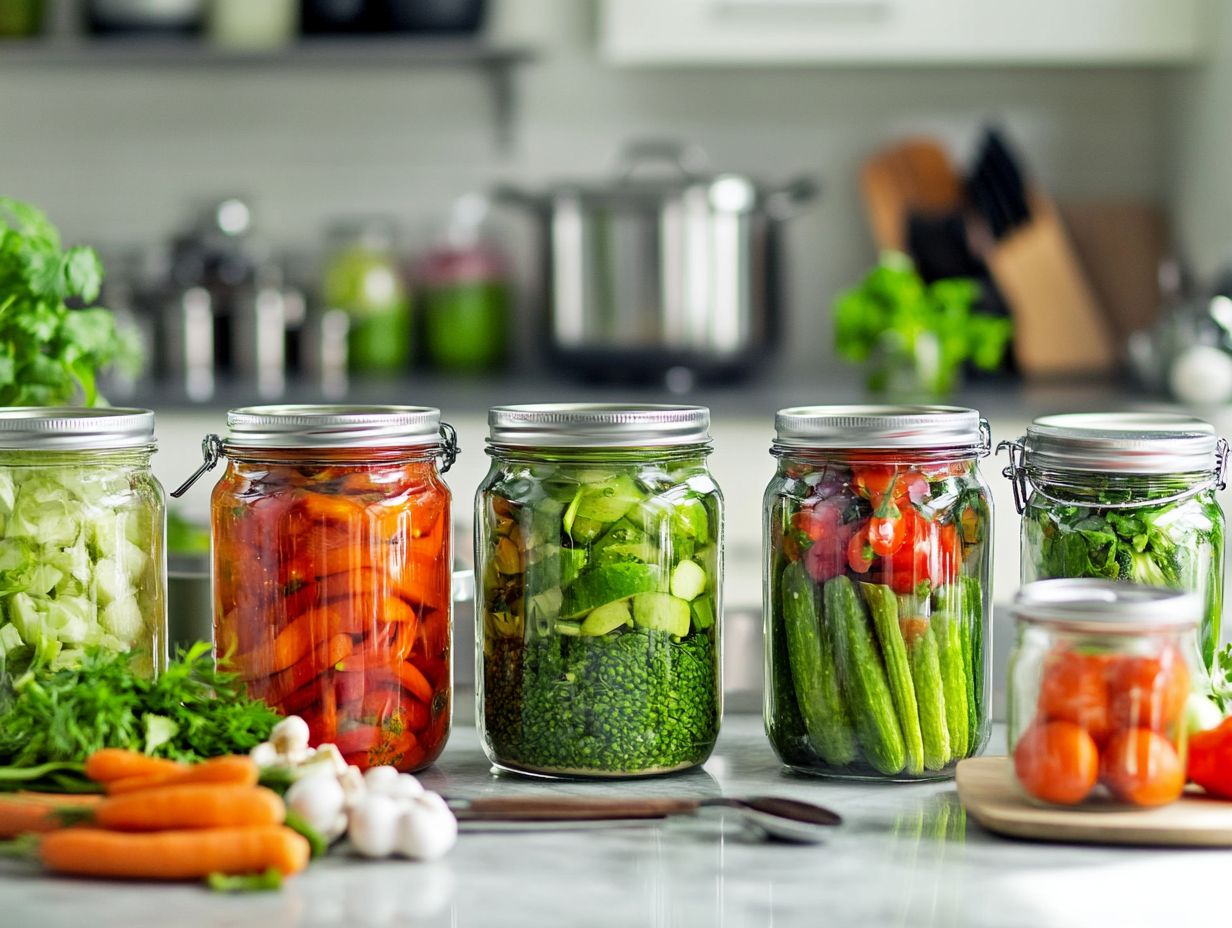
Using glass containers for canning allows for better visibility of the contents, easier cleaning, and reusability compared to other materials. Glass also does not leach any chemicals into the food.
What Types of Glass Containers Can I Use for Canning?
You can use any glass container specifically designed for canning, such as mason jars or heat-resistant glass jars. Always check for any cracks or chips before using.
Do I Need to Sterilize Glass Containers Before Using Them for Canning?
Yes, it is important to sterilize glass containers before canning to ensure the preservation of your food. This can be done by boiling them in hot water for 10 minutes or running them through a dishwasher cycle.
Can I Reuse Glass Containers for Canning?
Yes, as long as the glass container is in good condition and has been properly sterilized. Check for any signs of wear and tear before reusing.
Are There Any Safety Precautions I Should Take When Canning with Glass Containers?
Always follow proper canning procedures and use jars specifically designed for canning. Avoid sudden temperature changes, such as placing hot jars in cold water, as this can cause the glass to crack.
Don t wait! Ensure your jars are ready for canning today!
